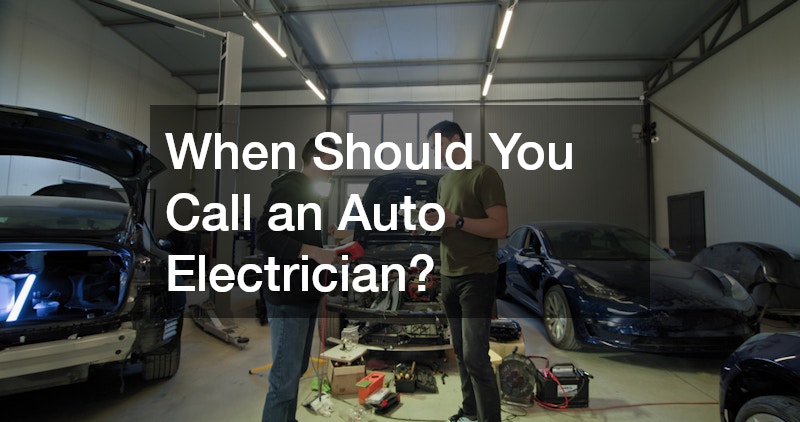Cars today are increasingly sophisticated machines, relying on advanced electrical systems to manage everything from ignition to infotainment. As vehicles evolve, the line between mechanical and electrical faults has blurred, making it more important than ever to understand when professional expertise is required. Knowing when to call an auto electrician can save you time, money and considerable stress, especially when issues extend beyond the scope of a general mechanic’s skill set. This article explores the key scenarios that warrant calling in a specialised auto electrician.
Electrical System Warning Signs
Modern vehicles are equipped with dashboard indicators that serve as early warnings for electrical problems. If the battery light, check engine light, or any warning symbol flashes unexpectedly, it might signal an underlying electrical fault. While some indicators can be minor and easily reset, others may point to serious issues such as faulty wiring, blown fuses, or sensor malfunctions. An auto electrician is trained to interpret these signals accurately using diagnostic tools that pinpoint the exact problem, reducing guesswork and avoiding unnecessary part replacements.
Another sign that warrants immediate attention is dimming or flickering lights. Whether it’s your headlights, interior lights, or dashboard backlighting, any unusual lighting behaviour may be a symptom of a failing alternator, poor battery connection, or worn-out wiring. These problems, if left unresolved, can compromise your safety, particularly when driving at night. An experienced auto electrician can inspect and repair the affected components before they escalate into more serious failures.
Battery & Charging Issues
Car batteries have a finite lifespan, typically lasting between three and five years. If your vehicle is struggling to start, or if the engine clicks but doesn’t turn over, the battery or the starter motor could be at fault. While some car owners attempt to jump-start the battery or install a new one themselves, these fixes are not always permanent solutions. A certified auto electrician can assess whether the battery is indeed the root cause or if the issue lies within the charging system, such as a failing alternator or corroded wiring.
Intermittent power loss is another common symptom of an electrical issue. If your power windows, radio, or air conditioning suddenly stop working and later resume functioning, it could indicate a short circuit or loose electrical connection. These types of issues can be frustratingly inconsistent, making them difficult to diagnose without the proper training and equipment. That’s where an auto electrician’s expertise becomes indispensable.
Malfunctioning Electronic Components
Today’s vehicles rely heavily on electronic control units (ECUs) to manage everything from fuel injection to gear shifting and climate control. A malfunction in any of these systems can lead to poor performance, reduced fuel efficiency, or complete failure to operate. If your car exhibits unusual behaviour, such as stalling unexpectedly or shifting gears erratically in an automatic transmission, it may be time to consult an auto electrician.
Modern safety features such as anti-lock braking systems (ABS), airbags and lane departure warning systems are also governed by electrical circuitry. If any of these features display errors or fail to engage properly, they could pose serious safety risks. Because these systems are interlinked, attempting to fix them without specialist knowledge can inadvertently affect other components. An auto electrician is trained to repair and recalibrate these systems correctly, ensuring your vehicle remains safe and roadworthy.
Upgrades & Installations
Not all visits to an auto electrician stem from mechanical issues. Many vehicle owners consult them for professional installation of aftermarket accessories such as dash cams, reverse cameras, stereo systems and LED lighting. These enhancements require precise integration with the car’s electrical system to avoid overloading circuits or causing future faults. DIY installations can often lead to wiring mistakes or drain the battery, especially if accessories draw power even when the engine is off. Engaging an auto electrician ensures installations are completed safely and efficiently, with all components operating as intended.
Similarly, vehicle owners who install towing equipment, dual battery systems, or solar panels for camping vehicles will benefit greatly from an auto electrician’s expertise. These setups require careful load management and proper fusing to ensure electrical stability. Whether you’re preparing for a long trip or upgrading your car for convenience, a qualified auto electrician can tailor the solution to your specific needs.
When in Doubt, Call the Expert
Sometimes, it can be difficult to determine whether an issue is mechanical or electrical in nature. However, erring on the side of caution is always advisable. Persistent issues like unusual smells (such as burning plastic), unexplained battery drain, or components that function sporadically could all be signs of electrical faults. A proactive approach not only prevents breakdowns but also safeguards the complex electronic systems that modern cars depend on.
Understanding when to call an auto electrician is key to keeping your vehicle running smoothly and safely. Their specialised knowledge bridges the gap between mechanical and digital, ensuring every component—from your starter motor to your safety sensors—is working as it should. Don’t wait for a minor issue to turn into a costly breakdown; know the signs and trust the experts when it counts.

